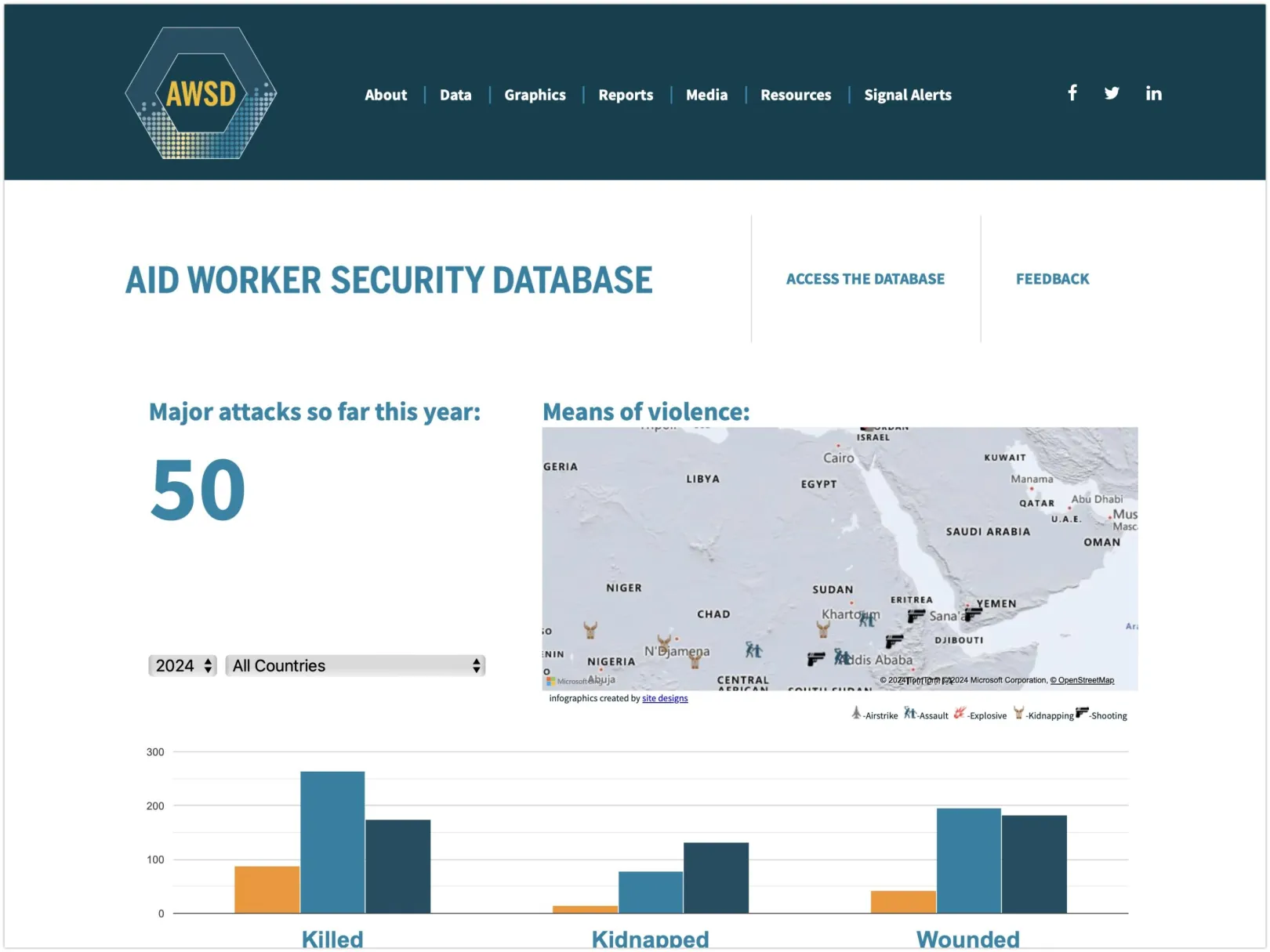About the project
The Aid Worker Security Database (AWSD) is a comprehensive global source that records major incidents of violence against aid workers. Initiated in 2005 and managed by Humanitarian Outcomes with support from USAID, the database includes incidents dating from 1997 to the present. The main goals of the AWSD are to collect and analyze data related to attacks on humanitarian workers, to help understand and mitigate the risks these workers face in various regions around the world.
The AWSD tracks detailed information on each security incident, such as the date, location, number of aid workers affected, and the nature of the attack (e.g., shootings, kidnappings). This information is gathered from public sources, direct reports from aid organizations, and security entities, ensuring a robust and verified data compilation. The database serves as an essential tool for research and strategic planning, aiming to improve safety protocols and responses within the humanitarian sector.
Moreover, AWSD data is used extensively by the United Nations, governmental bodies, NGOs, and media outlets to inform policy and operational decisions, enhancing the overall security environment for aid workers globally.
About the project
Goals: The primary objective of the AWSD subproject was to keep the database site technologically up-to-date. This upgrade was essential to ensuring that the AWSD site remains secure, capable of receiving all critical updates, and continues to function efficiently with the latest web technologies.
Requirements: The upgrade from Drupal 9.5 to Drupal 10 involved several technical and strategic challenges that needed to be addressed:
- Upgrading CKEditor from version 4 to version 5 to enhance the text editing experience.
- Replacing the outdated Seven theme, which was deprecated in Drupal 9.5, with a modern alternative that supports Drupal 10.
- Addressing the removal of jQuery.once from the core, which required adjustments to maintain JavaScript functionality.
Outcome and Solutions:
- CKEditor 5 Integration: The migration to CKEditor 5 was a significant step in improving content editing capabilities. This upgrade involved adapting to the new architecture of CKEditor 5, which is more modern and modular compared to its predecessor. iTechWeb handled the integration by leveraging the new plugins and configuration capabilities of CKEditor 5, enhancing the site's content management workflows.
- Theme Replacement: With the deprecation of the Seven theme, iTechWeb selected the Claro theme as its replacement. Claro is a contemporary admin theme designed for Drupal 10, known for its user-friendly interface and accessibility improvements.
- Handling jQuery.once Removal: The removal of jQuery.once was tackled by iTechWeb through the replacing the jQuery.once with Once core library. This ensured that dynamic and interactive site elements continued to operate smoothly without relying on the deprecated jQuery.once method.
The successful completion of these tasks led to an enhanced, secure, and future-proof platform for the AWSD project, aligning with its mission to maintain a reliable and secure database for aid worker security incidents worldwide.
iTech4Web conducted upgrade within the time and budget.
Why Drupal was chosen
For the Aid Worker Security Database (AWSD), Drupal was chosen as the ideal content management system due to its robust security features, high degree of customizability, and strong community support. Drupal's open-source nature allows for significant flexibility in designing a site to meet specific operational needs, which is crucial for managing the complex and sensitive data involved in tracking violence against humanitarian workers.
Drupal's capability to handle complex, content-heavy sites with extensive resource libraries is essential for AWSD, which requires a platform that can securely manage detailed incident data across multiple regions and years. The platform supports diverse content types and user roles, facilitating easy updates and maintenance without needing extensive technical knowledge.
Furthermore, Drupal's strong security framework ensures that sensitive data is protected, a critical requirement for AWSD. The CMS's scalability allows the database to expand as more data is gathered, making it a sustainable choice for long-term projects. The large selection of modules and customization options also enables AWSD to tailor the site to specific needs, enhancing both user experience and functionality.Drupal's commitment to accessibility and its ability to integrate with other systems and APIs further solidifies its role as a cornerstone technology for projects demanding a secure, scalable, and flexible web presence.

Technical Specifications
Drupal version:
Key modules/theme/distribution used:
To ensure CKEditor 4 and the Seven theme can be safely disabled, we have to install this modules with composer on Drupal 10 codebase.


